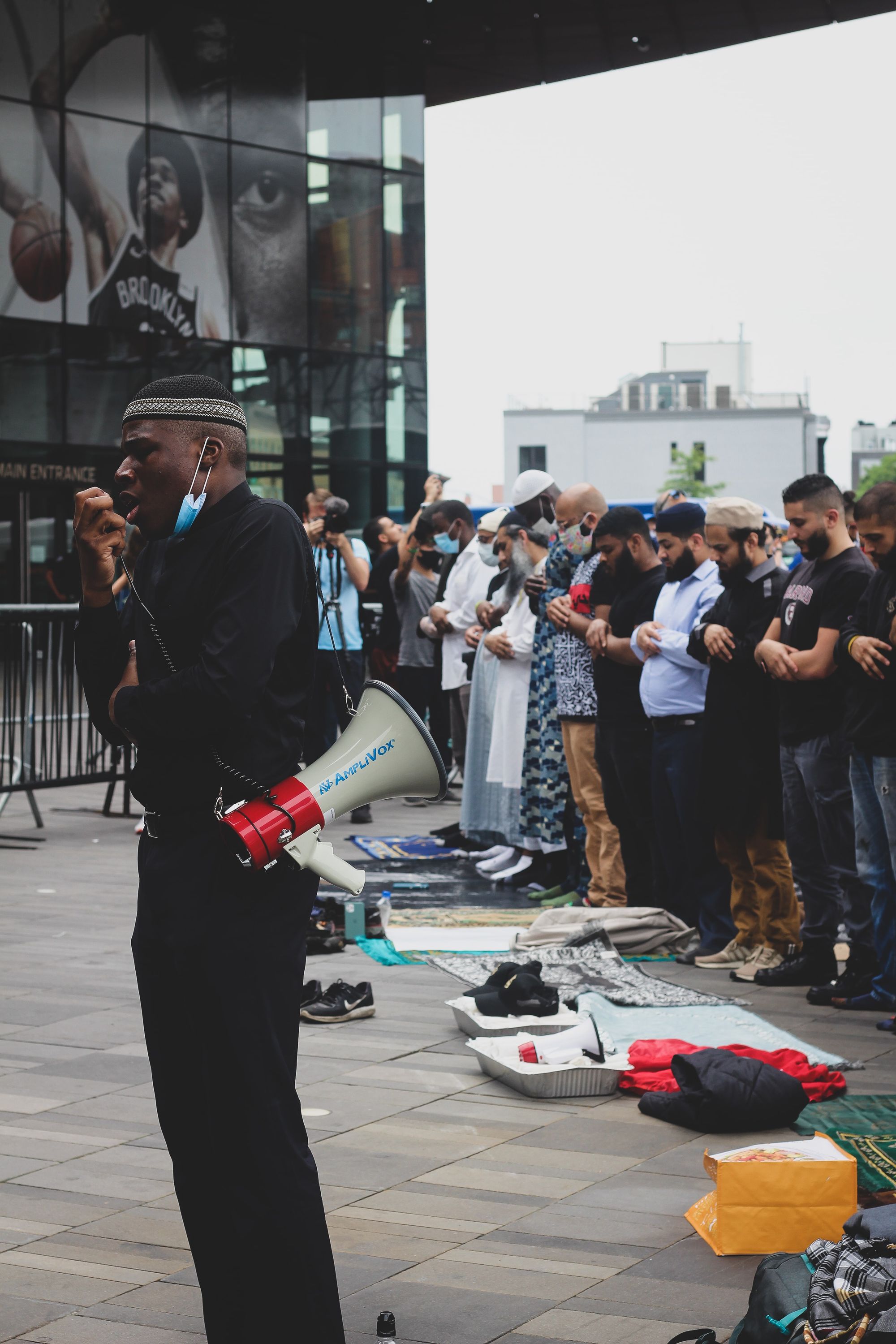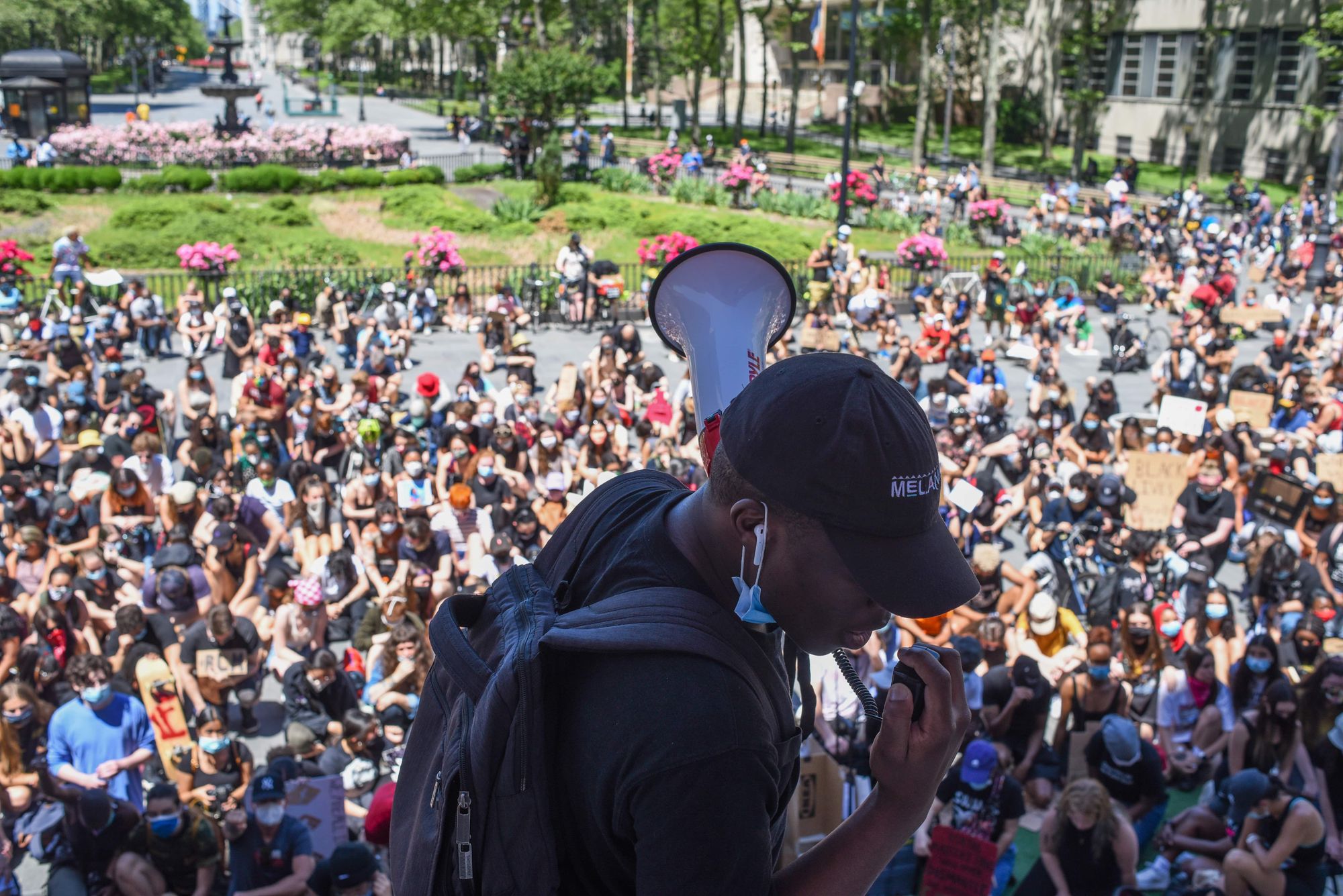‘I Shouldn’t Have To Be Afraid To Just Live:’ Alhassan Umar From The Bronx Goes Viral In Brooklyn


THE BRONX – When Alhassan Umar was almost two years old, he moved to the Bronx from Ghana. A few months later, 23-year-old Amadou Diallo was shot and killed by the police in that very borough. About twenty-two years later, George Floyd was also killed. Now, Umar, a 23-year-old Bronxite himself, has had enough. It’s time to speak up, he said. And speak up he has. On a warm Sunday afternoon, he spoke to us about escaping his Muslim identity and then embracing it, what his Blackness means to him, and his speech at the Barclays Center that went viral.
Umar is a Black Muslim. He has four younger sisters and he fears for their life all the time. He fears for his own life.
“Every time I hear police sirens or if a cop car passes by me, I walk slowly. My heart starts beating fast even though I’ve done nothing wrong,” he said. “Because I’ve seen way too many videos where if I was to encounter them, things will probably not end well for me. And I shouldn’t have to feel like that. I shouldn’t have to be afraid to just live.”
For the longest time, Umar felt as if he never fit in. Growing up in America, he said the people he was around never fully accepted him as a Black person because he was from an African household. And in Africa, people never fully accepted him as an African because he was from America.
“I was always seen as the other. And the only identity that I could hold on to, that communicated with people no matter where I was, was my Muslim identity,” he said.
But he didn’t always feel this way. When he was younger, he’d tell people his name was Ally. He changed his name to make it easier to fit in other people’s mouth– a story all too familiar for children with beautiful names. Umar was also embarrassed by his parents. He describes them as being “super cultural.” They’d dress African and wear modest clothing. He didn’t care much for Eid and Ramadan; instead, he’d focus on celebrating Christmas with his friends. He was just a kid who wanted to fit in. And it didn’t help that he was facing Islamophobia.
When he was younger, he’d mostly go to African-majority masjids. As he got older and started traveling more across the city, he’d go to different mosques. He began to notice changes.
“Immediately, when they see that contrast skin color, they would stop smiling,” he said. “There have been instances where I’ve witnessed imams object to Black people leading the prayer. They would refuse to have the prayer led by a Black person.”
When he was 13-years-old, he went back to Africa. And that’s where it all changed.
“I went back to study Islam. Studying about Islam, studying about the Prophet Muhammad, studying about the contributions he and his companions made and changed the world… All these stories really made me proud of my Islamic background,” he said. “I’ve seen Muslims in Africa who would forgo worldly needs and material possessions to increase their knowledge in Islam. The things that I was trying so hard to gain when I was younger, they would let go like it was nothing, just to become closer to Allah.”

When he came back to the U.S., he began to notice the racism that surrounded him.
“I started to pay attention to [racism] more. Like how the white teachers in our school would address us,” he said. “Or when I started to take public transportation and got to neighborhoods like Brooklyn. I saw the way when you sit down on the train, you would see the white people refuse to sit next to you. But the moment you get up to leave the train, they would be rushing for the seat.”
While he was fortunate enough to not experience any police brutality, he did face a lot of microaggressions. And those microaggressions made him question himself.
“Am I even worthy as a Black person?” he remembers asking himself. “It seems like I’m being disrespected everywhere I go.”
But he always stayed quiet. No matter what he faced, he didn’t believe that speaking up would do anything. That is until George Floyd was murdered.
“I don’t think I’ve felt this way in my life. To watch raw brutality happen in real-time. This is not a movie. These are not paid actors. This is a human being deciding to do this to another person,” he said. In order to deal with that trauma, he suppressed his feelings and kept it in the back of his head.
“Like this happens all the time and we’re tired of it and don’t want to give it any attention,” he acknowledged. “I tried to go back to my normal life.”
But he couldn’t. Floyd’s death was affecting him too much. One day, he saw one of his friends post a video of him attending a protest on Instagram. Watching the videos inspired Umar. And that’s when he decided he was getting up; he would no longer stay quiet.

“It was recognizing who I am as a Black person. Not only am I Muslim, I am a Black Muslim. Which means all of these things, I am at risk of it happening to me, too,” he said. “I realized that sitting down won’t make it all go away. It’s all fun and games until it happens to one of your own. It’s all fun and games until it happens to you.”
It just so happened that he was invited to lead the prayer at the Muslims Against Police Brutality protest last week. And after he led Asr outside the Barclays Center, he grabbed the megaphone, pulled down his mask, and began to speak from the heart.
“So many of us Muslims in this country are immigrants. We benefit, I repeat we benefit, from the fight that our forefathers and our foremothers in this country fought… If the previous Black leaders, if the previous colored leaders, did not stand up for their rights, we would not be able to congregate peacefully like we are doing right now,” he said. “My message to the Muslim community is, stop looking at this like it’s an African-American problem. This is a problem of humanity.”
“If those who we have entrusted power with to take care of us are capable of ending my life because of the color of skin, then you will not be safe from it because you are also different from them,” he said. “To my Muslim brothers and sisters, speak up. Do your part. Do not be silent. Every voice counts. Every action counts.”
"To my Muslim brothers and sisters: speak up, do your part, do not be silent."Watch this powerful speech from a Muslim activist during a Black Lives Matter rally in Brooklyn.
Posted by Middle East Eye on Thursday, 4 June 2020
After his speech went viral, he received a lot of support and positive feedback. He recalled that a Jewish man came up to him and told him how his speech touched his heart. He laughed and recalled that a Selena Gomez fan page on Instagram shared his video and encouraged people to check out his page. “I would say that’s the last thing I ever expected. A Selena Gomez fan page telling their followers to check out a young imam’s Instagram page.”
Currently, Umar is a junior at Hunter College and majoring in Clinical Psychology. He’d like to be a therapist in the future. He wants to help people go through their trauma and help people deal with heir emotions. He wants to engage the youth and help them “figure things out and find a way to navigate the waters of this world.” He wants to keep spreading Islam and its message. He wants to continue educating people. And he wants to keep speaking up.
“I like to say, if everyone was blind, we would run out of things to hate each other for. There would be no way to tell if you’re from this country or this skin color,” he said. He then mentioned a hadith (word of the Prophet) that said “None of you will believe until you love for your brother what you love for yourself.”
“The America I would like to see is an America that applies this hadith. An America where every person I come across cares for me and has my best self-interest at heart,” he said. “Where we are not selfish. Where we don’t hurt one another. Where we don’t watch people starve right in front of us and do nothing. Where we don’t judge one another. Where we help one another and love one another. That’s the America I would like to see.”




